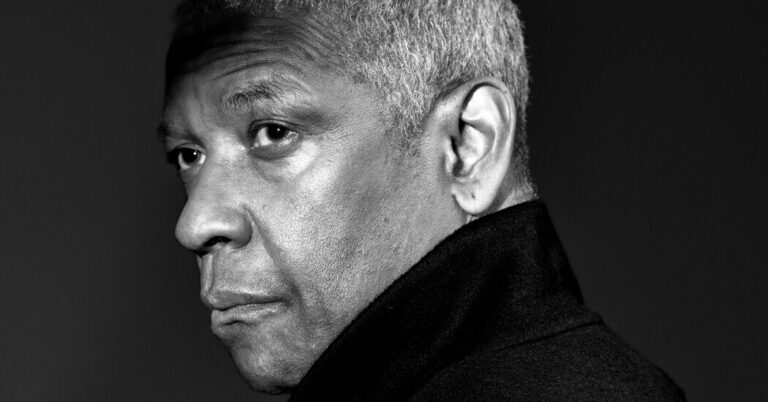Here is the text of the article:
Amoeba Records, on Hollywood Boulevard, isn’t the best place for someone of Seth Rogen’s visibility to shop hassle-free. Located just blocks from the Chinese Theater, right by Dr. Phil’s and Dr. Oz’s stars on the Walk of Fame, there may be few places worse. But when Rogen wasn’t being interrupted by his admiring bro-fans, who were legion – one wore toe shoes and a Lil Dicky shirt; another cried – Amoeba was, however, a perfect place to dig through hundreds of vinyl soundtracks. It was the Tuesday before the Oscars, and we were there with Rogen’s longtime creative partner, Evan Goldberg, to browse records and talk about their latest creation: “The Studio,” an ambitious, celebrity-stuffed industry satire for Apple TV+ that premiered on Wednesday.
Rogen had been tasked by his wife to stock more jazz – appropriate given the new show’s jazzy score and improvisational feel, shot mostly in long single takes. But as Goldberg and Rogen, who have been friends since they were teenagers, noted, their taste in music had really been formed by their love for movies.
So we found ourselves first among the soundtracks, where highlights included a reissue of “The Three Amigos” – “One of my favorite movies of all time,” Rogen said – and two copies of the soundtrack for “Soul Man,” the 1986 comedy about a young white guy who pretends to be Black in order to get a Harvard scholarship. (Different times, as they say.) “Dude, I was just telling some people at work about this yesterday!” Goldberg said. “It has a good soundtrack,” Rogen ventured.
Then, as if speaking with one mind, simultaneously: “Is it racist to buy it?” “Is it racist to own this?” It was, in retrospect, a layered moment: In their hands, Goldberg and Rogen, who for decades have tested the boundaries of mainstream comedy, held a veritable object lesson on what not to do. By comparison, these two men and their early brand of sweet-but-raunchy stoner comedy had managed to evolve and survive the vicissitudes of time, taste, and social attitude, even as not every joke – nor every career among their cohort – survived with them.
In many ways, “The Studio,” in which Rogen plays the beleaguered head of a fictional major studio, speaks to their evolution. They are no longer the young Canadian outsiders; they’re powerful producers in their 40s with the ability to make and break dreams themselves. You just might not guess that from the shorts and sneakers or their other big joint venture: a high-end cannabis accessories company. (Rogen remains one of Hollywood’s most famous weed connoisseurs.) Staring down at the “Soul Man” soundtrack, Goldberg took a more determined tone. “We should get it,” he said. “How much is it?” “It’s only $4,” Rogen said. “We’ve got to get the ‘Soul Man’ soundtrack.” Goldberg nodded. “Just so people ask, ‘What is that?’” he said. “Oh, I’ll tell you what that [expletive] is …” Thus was the allegory of the “Soul Man” soundtrack completed: Buying it felt a little dumb, a little risky, but also hilarious. They snatched it up with glee.
GOLDBERG HAS IT GOOD. He gets to avoid a lot of the public-facing obligations that come with being Rogen. He openly cherishes the freedom. Rogen recently did a podcast interview in which the host said, “‘I would be jealous if I was Evan.’” When Rogen relayed this at the record store, Goldberg said: “Then you need therapy, my friend.”
The many (many) celebrities in “The Studio,” most playing versions of themselves, have so far helped insulate him from much of the buzz surrounding this latest endeavor, too, even as he and Rogen created the series and directed all 10 episodes. The premiere alone includes Steve Buscemi, Bryan Cranston, Paul Dano, Martin Scorsese, and Charlize Theron. The main cast includes…aria-label=”companion column”
UNSURPRINGLY, “THE STUDIO” is as much a love letter as satire. Since Goldberg and Rogen were in their mid-20s, they have worked mostly inside the studio system, which, for all the jibes it weathers in the show, has been very kind to them.
A running gag in “The Studio” has Rogen’s character, Matt, a devoted cinephile, struggling to make a Kool-Aid Man movie without completely losing his soul. (How many of Matt’s fears reflect Rogen’s own? “I’d say all of them,” Rogen said.) But Goldberg and Rogen insist they aren’t so much skewering the industry as writing what they know.
We thank God we’re in a position where we don’t have to make the Kool-Aid movie,” Rogen added. “But the funny thing about studio executives is they do. And that is something that just became entertaining to us.”
Source link




